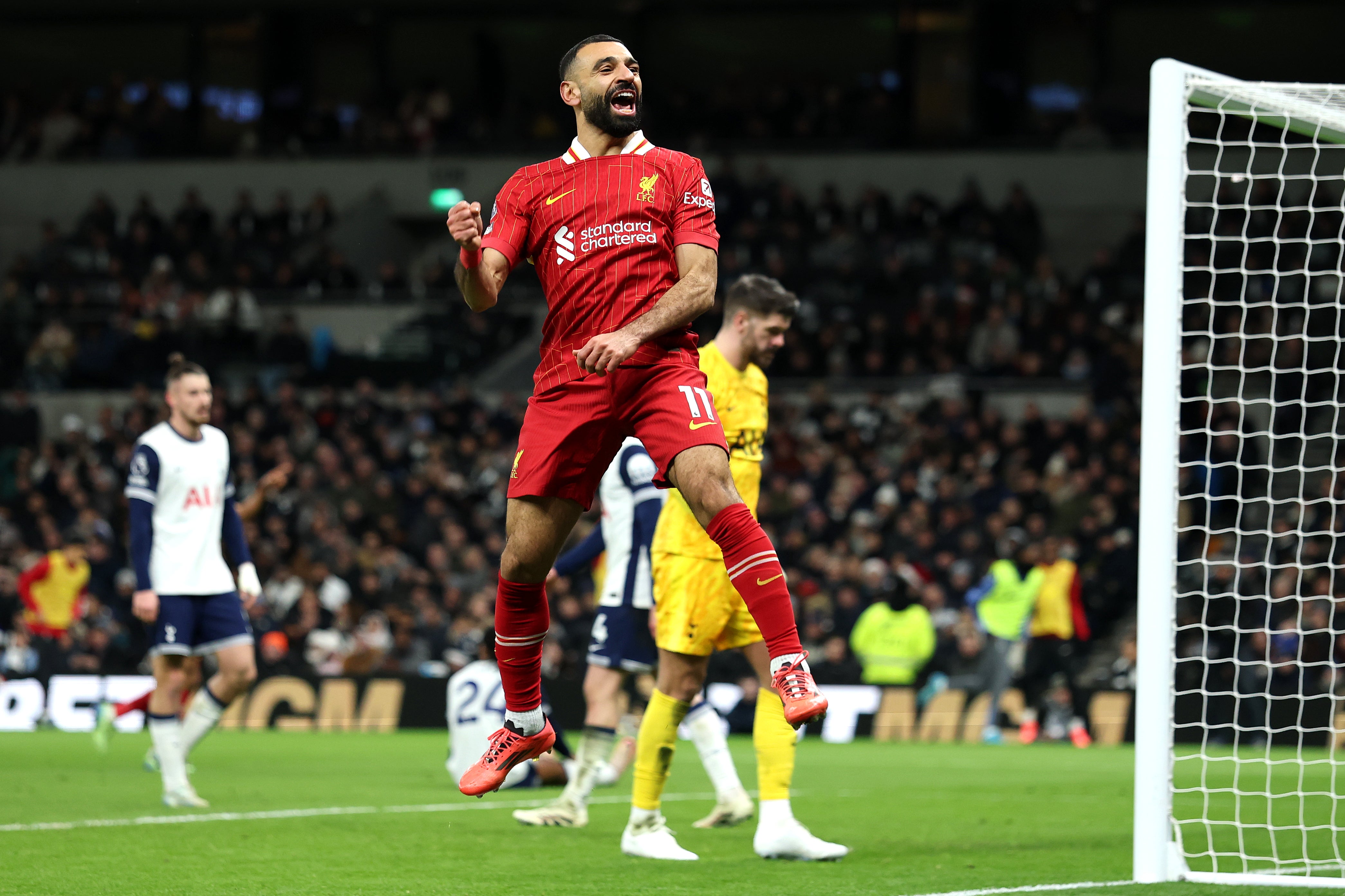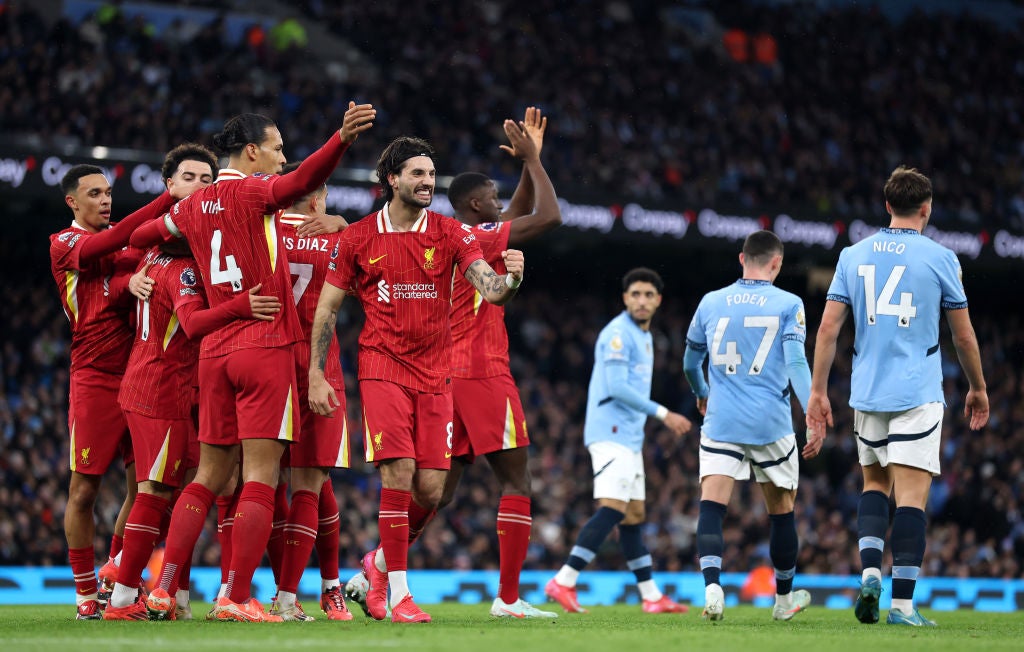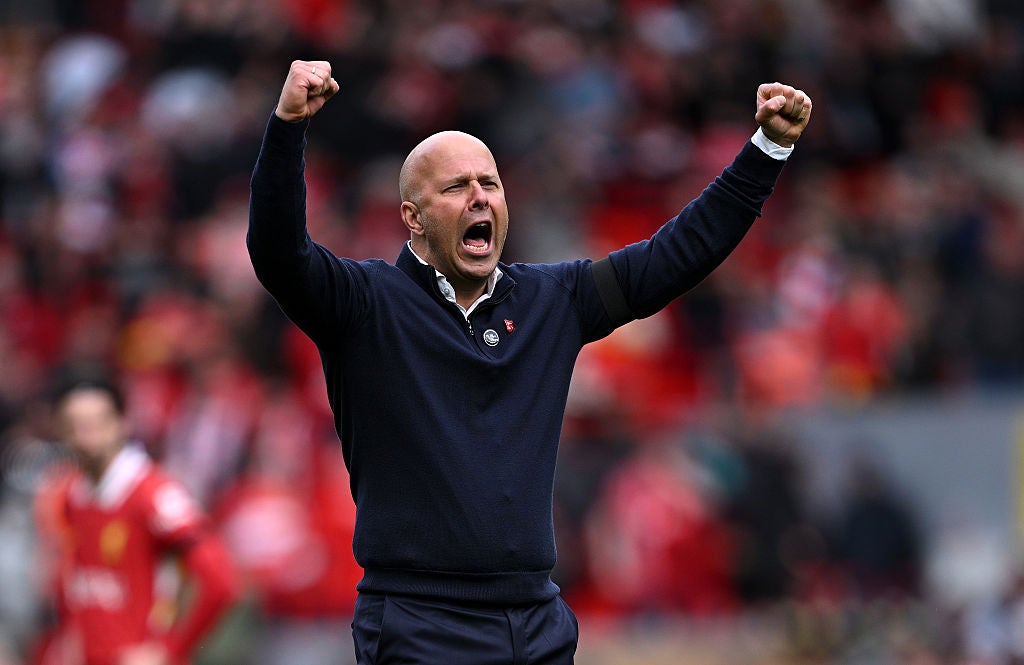If Liverpool can finally be called English champions again, you can’t really repeat the old line that they’re back on their perch. They’re now on a pedestal. They can look down on the rest of the Premier League from high above, finally free to celebrate amid the certainty of victory. There is also an even better view from that vantage point, that has been surprisingly underplayed in this long run to the title. This is Liverpool’s 20th, matching the record of their great rivals Manchester United.
A mere 15 years after losing that record themselves, Liverpool are again the country’s most successful club in both the league and European Cup. That gives them another title, that is now undisputed, which is England’s greatest club in terms of glory. Above them only sky, as one of the city’s famous sons sang.
Many at Liverpool would insist this is all about getting to properly celebrate a long-awaited league in the way they couldn’t in 2020, and it can indeed be easy to get lost in the numbers around such feats, when the true value is the emotion. Virgil van Dijk was right to rebuke people for saying this isn’t special.
It’s a league title, which should always be treasured. This team are part of a lineage going back to 1888, while adding to their own club’s grand history. This is glory.
It is still numbers that tell the story of why they are getting to celebrate, and that doesn’t even mean Arne Slot becoming just the ninth manager to win a title in his first English season, or the first Dutch coach to win full stop.
It is the effect of his management, and Liverpool’s strategy, two facets that are quantifiable.
By 1 March, which was pretty much the point when the title race was settled, the two Premier League players with the most minutes were Van Dijk and Mohamed Salah. The centre-half was first and the Egyptian second, and that included goalkeepers. The only other outfield player in the top 10 at that point was Nathan Collins.
The duo’s constant presence when it actually mattered had an immense effect on a season characterised by injury crises elsewhere. Both of the putative rivals, in champions Manchester City and challengers Arsenal, endured long spells without major players.
Liverpool just kept excelling.
The embittered temptation – including among some rivals – has been to cast this as luck. It is anything but. It is football intelligence and advanced preparation, of the sort that offers a lesson for other clubs as well as a pointer for the future of the sport.
That such a crucial advantage was figured out by a club under US ownership who also have American sporting franchises is perhaps no coincidence. This is football realising the maxim of famous NFL coach Bill Parcells, that “the most important ability is availability”.

It could even be described as “Moneyball” for a modern game ravaged by a new calendar. Except, rather than getting on base, it’s getting your most productive players on the pitch.
Slot had a central role in this, and it was partly why he was picked for the job. Such thinking also illustrates how this wasn’t simply a case of stepping in after Jurgen Klopp, and the succession was more difficult than commonly appreciated. More recent talk of a team overhaul only emphasises that. Slot made it look easy.
Klopp’s departure saw the hierarchy take the opportunity for a restructure, as recruitment guru Michael Edwards was keen to return on the proviso that Liverpool became a properly performance-led club. This essentially means more decisions shaped by data and science, rather than top-down from the manager.

It would probably shock people how this isn’t the case at many major clubs, right into 2025.
Slot was partly chosen because of his embrace of such approaches, as well as his willingness to complement his evolved positional-possession tactics. He fit the new structure. One rival chief executive describes him as “the best coach in the world”, and also one largely without ego. That now involves the measured temper to empower specialists such as Jonathan Power, the director of medicine, as well as Conall Murtagh, head of physical performance.
Such figures could become as celebrated as cult heroes like set-piece coaches, given how the calendar is going. Murtagh was appointed in May 2024, and set about implementing a new strategy. Working with Slot’s own Ruben Peeters, the Irishman heavily utilised AI in a real-time model that allowed first-hand player management. The club are constantly on top of every physical metric, down to the finest details.

The result has been a game-changing fitness record, that has allowed Slot to much more easily implement a new ideology.
Even before the early statement of the 3-0 win at Old Trafford, Salah spoke of “a big difference” in possession and pressing. “The manager now wants to control the ball all the time… sometimes slow things down because that’s part of the plan.”
That adds even more substance to how the Klopp-Slot succession is an echo of Bill Shankly-Bob Paisley. Aside from the more measured football, there is also the evolution from the charismatic power of a patriarch to the deepening of a wider club structure. Man to machine, if you like, just like in the 1970s. Slot may herald a wider shift in how he’s a less intense figure than many modern managers, willing to collaborate in clubs that are increasingly science-led.
Those close to Klopp might fairly say Slot is fortunate to not have had Manchester City as the machine they were, but that is just how it falls. Liverpool still beat them twice, in 2-0s that really could have been 5-0s. The most spectacular display was probably the 6-3 at Tottenham Hotspur but what most stood out was the smooth consistency. This was of a piece with Slot’s understated nature, elevated by the effervescent efficiency of Salah and assurance of Van Dijk.

There is at least some irony in how so many of Liverpool’s match performances drastically accelerated in second halves, because that is the reverse of the season. This title was really won before Christmas.
There is admittedly a modern football issue relevant to this, in how a superclub getting it right can streak away. For all the talk of this season’s unpredictability, one of the world’s wealthiest clubs – who can afford to maintain their squads with two huge new contracts – has won by a distance. The owners are meanwhile most concerned with deriving profits out of the sport.
As with City, though, football figures like Slot, Salah, Van Dijk and the brilliant Alexis Mac Allister can still overperform admirably in that context.
Another irony is that Liverpool’s very superiority has led to an unfair dismissiveness of the scale of their feat. If they were more fallible, and allowed some tension into the title race, it would oddly lead to greater appreciation. There’d be talk of mettle and doing it under pressure. Liverpool have been too good for their own good, although that still raises the question of where this stands in history.

The 2024-25 champions clearly aren’t as brilliant a team as Klopp’s in 2019-20, or by extension some City sides under Pep Guardiola, as well as the best of Manchester United, Chelsea and Arsenal. That’s maybe where points records and other trophies have more value, since they naturally create a greater legacy.
Liverpool’s pure football performance still puts them ahead of several other champions in the Premier League era, but that’s not what’s important here. It doesn’t need to be anything else.
It is 20, a title duly delivered by numbers and data.



